National Infertility Awareness Week: What Does Infertility Look Like?

The media often depicts the average person with infertility as either a middle-aged female who chose a career over family obligations or a Caucasian, affluent female past her prime reproductive days who can take full advantage of all the latest that assisted infertility treatment (ART) has to offer.
The truth is that infertility doesn’t discriminate between economic status, ethnicity, sexual orientation, socio-economic status, age, lifestyle, or gender. In honor of this year’s National Infertility Awareness Week, Washington Fertility Center is shedding light on what infertility really looks like.
The Faces of Infertility
Inclusivity and preconceived notions about infertility can potentially harm people suffering from the condition and those who could more effectively offer support, knowing the facts. For those with infertility, the absence of relatable people in the media combined with the common misperceptions about the disease can lead to a compounded sense of isolation. Infertility is already known to engender feelings of loneliness, isolation, and depression.
So, let’s take a look at the real faces of infertility; who does infertility commonly impact?
Ethnic Groups
One group commonly overlooked in the fertility community is African-American women, with a higher-than-average rate of infertility linked with medical conditions (e.g., fibroid tumors and polycystic ovary syndrome). Studies show that African American women have a higher rate of hysterectomy-induced infertility than White women.
Certain conditions, which are more common in certain ethnicities, are strongly associated with the inability to conceive a baby. For example, one study shows that among Asian women, there is a higher prevalence of low ovarian reserve (the number and quality of eggs) compared with White women.
Male Infertility
Nearly half of all infertility cases involve men, but they are virtually ignored in many infertility conversations. Although infertility can cause different emotional challenges in men, they are often emotionally comparable to women’s issues. For example, many men with infertility feel a sense of demasculinization. In relationships with couples facing in vitro fertilization {IVF}, men are equally impacted by many of the same issues of infertility treatment — such as uncertainty, stress, and anxiety — still, male infertility is rarely considered part of the infertility dialogue.
Age
People over 35 are not the only ones who are impacted by infertility. A common misconception about infertility is that it occurs at a certain age. Although many people believe that the problem primarily affects older women. While it is true that egg quality declines with age, many cases are caused by pre-existing conditions or genetic factors.
The LGBTQ+ Community
Fertility studies and literature need to better account for the LGBTQ+ community. There are millions of LGBTQ+ people in the country, and 14.7% are raising children, according to the US Census Bureau. While a percentage of those children are likely adopted, the number of LGBTQ+ individuals and couples opting to have babies with the help of assisted reproductive treatment continues to grow.
We Can Help
No matter your age, gender, ethnicity, or socioeconomic background, Washington Fertility Center can help. We offer comprehensive male and female infertility treatments using the most advanced techniques. If you are struggling with infertility, we can provide affordable fertility treatment and care in and around Virginia, Washington, DC, or Maryland. Contact us for a consultation today.